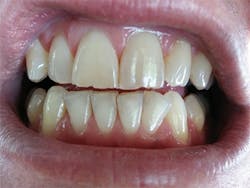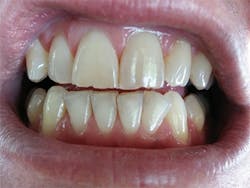Losing the patient's trust
BYDIANNE GLASSCOE WATTERSON, RDH, BS, MBA
Dear readers:
From time to time, I get inquiries from patients who find me on the Internet when they are researching a dental topic. In about 90% of cases, these inquiries come from patients who are unhappy or suspicious of their dental office, and it's often dealing with periodontal disease treatment. I want to share a recent post I received from a man who had serious misgivings about the care he received. I have edited the post to protect the patient's identity and for brevity.
--------------------------------------------------
Other articles by Watterson
- Conflicted Over Fees: Evaluate why fees are high before feeling guilty about them
- Dealing with Benefit Denials
- Problem with coworker
--------------------------------------------------
"I just went to a new dentist today who said (the tech actually) my sulci was up to 5mm in some places, and recommended root planing/scaling. She even demonstrated with floss there were a few 'ridges' between the base of teeth and gums.
"I had received the same news several years ago from another dental office, a franchise practice, that used very high pressure in the office, wanted me to come in several times for this special cleaning (total about $500 out of pocket), pushed a $200 electric toothbrush on me, and refused to do my bi-annual standard cleaning until after the process was complete. I told them that by the time these steps were completed, it would be time for my next cleaning anyway. So why not just do the normal cleaning now, and I'll reschedule for the root planing/scaling. They said no; they would not do the standard cleaning unless I did the scaling/planing.
"So I found another dentist to do the cleaning. This dentist (that I had for about five years) said there was no issue with my gums; there was a little space in there but no reason for alarm.
"My gums never bleed from brushing alone, only from flossing in certain places.
"Now I've had to move again, and I find myself back in 'periodontal town.' The dentist is refusing to allow my normal cleaning until I do the root planing/scaling. This time, my out-of- pocket expense is only $200, and no mention yet of a special toothbrush. I gave them the go-ahead. It took approximately 45 minutes, and they charged $760. She used a gel to numb the gums, a scaler and then the sonic blaster water pick. $760 seems steep for less than an hour's work for a tech and common dental tools (dentist never appeared today). Honestly, I couldn't tell much difference between this and a routine cleaning, except maybe a little deeper below the gum line. In my opinion, I should have been charged as a normal cleaning (free with dental plan) plus maybe an extra $100-200. The estimated patient responsibility from the $760 is $192, which I swiped with my flex spending card. She said it wasn't too bad in there, so I said, 'So it's basically like gingivitis plus,' and she said, 'Yes.'
"But honestly, it seems like a way to get a sign-on bonus from a new patient. I mean, how would that play on an existing patient who comes in one day to the doctor saying there's all these periodontal issues? Nope, better to tag the new patient with the $$ and say 'Your old dentist sure didn't catch this stuff, did he?'
"Is this a scam? What are some of the specific questions I should ask to verify this is legit? I've attached a picture of my teeth and gums to give an idea of what's going on inside my mouth.'
This is how they lose trust
Since I am not in the business of diagnosing people over the Internet, I did not pass judgment or comment on this patient's true need for definitive periodontal scaling. I did recommend to the writer that he should trust his instincts, and, if he feels something is amiss, he should seek another provider.
So many issues need to be addressed. It is obvious that the first office did a very poor job of communicating with the patient in describing the problem and took a rigid stand by refusing any care unless he submitted. He did not like the idea of the expensive brush, although he may have benefited from it. The patient went in with the expectation of getting his teeth "cleaned" but came away suspicious and disgruntled. What did he do? He divorced the practice and found another dental home.
The patient stayed in the next practice for five years. Evidently, this dentist felt the patient's condition could be managed with a biannual prophy. Again, I refuse to pass judgment, as I have not examined the patient nor seen his periodontal charting. This practice confirmed the patient's suspicions that something was amiss in the former practice.
Upon relocating again, the patient finds himself in another practice that recommends definitive periodontal care. The patient agrees to the recommended care, but now he feels he was scammed. After all, the whole procedure took less than an hour, did not require a local anesthetic, and seemed to the patient like a glorified prophy. If we were in this patient's shoes, we'd probably feel the same as him. I doubt he will ever trust this office again. When a business loses the customer's trust, it's likely they will lose the customer.
How 'techs' project themselves
Another glaring problem is that the hygienist is referred to as a "tech" rather than a hygienist, which says to me that the patient did not view the clinician as a serious health-care professional. There seems to be a real image problem within the profession itself, in that the "cleaning lady" or "tech" image persists. Do dental hygienists perpetuate this image by how they deliver care? Have we brought this upon ourselves? Has the push to do more with less time in an effort to increase production caused the public to question the quality of care delivered by hygienists?
Most likely, the writer is dealing with a mild periodontitis problem. I would speculate that he has some mild bone loss in the posterior areas that could benefit from definitive scaling. Clearly, the time to attack periodontal disease and achieve the best outcomes is before the disease has progressed deeply into the periodontal structures. In all likelihood, this patient needed some site specific scaling (D4342) on teeth with evidence of bone loss, and a prophy on the remainder (or non-perio) teeth.
The treatment plan should have involved three visits:
• Prophylaxis
• D4342 scaling on periodontally involved teeth on the right side of the mouth
• D4342 scaling on periodontally involved teeth on the left side of the mouth.
His home-care instructions should have included strategies at eradicating microbes with home irrigation and antimicrobial medicaments. Then the patient should be placed on maintenance (D4910) but with a narrative to the insurance provider stating: "If D4910 is denied, please provide the alternative benefit of a prophylaxis. The ongoing periodontal maintenance visit included prophylaxis (D1110)." Many insurance providers do not cover D4910 maintenance after D4342 procedures.
The hygienist and doctor both have a part in helping patients clearly understand their periodontal problems. After gathering the pertinent data, the hygienist should relay this to the doctor for the diagnosis. Then, a treatment plan should be developed and executed. We need to be completely ethical with treatment planning and allow for ample time to work one-on-one with patients in customizing their homecare. After all, what good have we done if all we do is remove debris but don't teach patients how to care for themselves at home?
There is so much more that could be said. Patients are not stupid, and we are to blame when we lose their trust. RDH
All the best,
Dianne
DIANNE GLASSCOE WATTERSON, RDH, BS, MBA, is a professional speaker, writer, and consultant to dental practices across the United States. Dianne's new book, "The Consummate Dental Hygienist: Solutions for Challenging Workplace Issues," is now available on her website. To contact her for speaking or consulting, call (301) 874-5240 or email [email protected]. Visit her website at www.professionaldentalmgmt.com.

